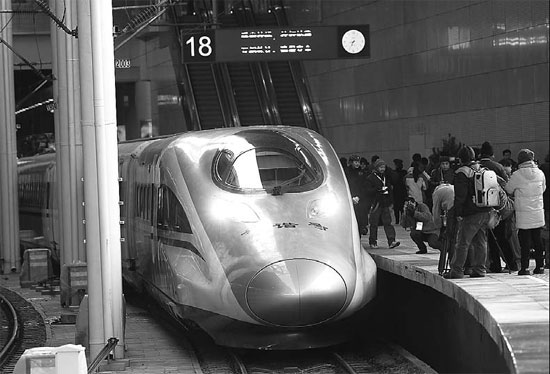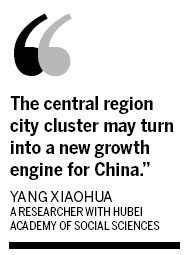
|

A high-speed train for the Beijing-Guangzhou route is set for test operation in Beijing on Saturday. Opening of the line will not only benefit towns and cities along its route but also release huge cargo transport capacity. Zou Hong / China Daily |
Route expected to generate huge business opportunities, analyst says
The world's longest high-speed rail service, which starts between Beijing and Guangzhou on Wednesday, is expected to bring huge economic prosperity to towns and cities along its route, creating what officials are calling world-class "city clusters" across Central China.
Designed to carry passengers at an average speed of 300 km per hour, the high-speed link will cut travel time between the country's capital and the southern economic center to about eight hours.
There will be 35 stops along the way, including major cities such Shijiazhuang, Zhengzhou, Wuhan and Changsha, and the route will cut through areas with a combined population of 300 million to 400 million.
"Opening the route will not only bring these cities closer, but will generate business for many different supporting facilities, promoting change in their growth patterns for years to come," said Wang Mengshu, an academic at the Chinese Academy of Engineering.
He said GDP growth in many of those areas had been independent of each other in the past, and relied mainly on real estate development and automobile sales, both of which had been run inefficiently while consuming massive resources.
Better access to fast railway links will now mean improved cargo transportation between factories in various cities, leading to greater expansion of support facilities, Wang said.
"Railways will indeed become a way to increase prosperity for so many industries," he added.
Wang calculates that a 600-billion-yuan ($96 billion) annual investment on railway construction could generate 3,000 kilometers of railway a year, which in turn could raise the country's annual GDP growth by 1.5 percentage points, and create more than 6 million jobs.
He said the country's tourism industry was likely to be one of those to most benefit from the high-speed rail development, and many in the sector have already been preparing to take advantage of the opportunities.
For instance, at Shijiazhuang Railway Station in the capital of Hebei province, which is the nearest major city to Beijing on the line, two new squares are being built together with a tourist center.
"The goal is to promote one-day trips, and to try to convert 'passing-by' passengers into 'staying over' passengers, which will really help boost the local catering and hotel industries," said Wen Hao, the director of the city's tourism office.
Apart from increasing the flow of people into the cities, the railway will also greatly increase freight traffic, he added.
Although largely being seen as a passenger line, Wu Ruliang, director of the Logistics Association of Hubei Province, said his industry will benefit greatly from the new high-speed link, and expects the cost of express delivery to drop by at least 50 percent as a result of its opening.

Officials from the Ministry of Railways have said the new route will release cargo transport capacity on the old line between Beijing and Wuhan by 20 million tons a year.
Wu added that with 95 percent of highways and 65 percent of class-A roads now installed with toll gates, the logistics industry will view rail transport as an altogether more appealing prospect than road from now on, given that toll costs currently account for a third of all logistics costs.
"The opening of the service means the logistics industry will enter a new era of high-speed rail transport," Wu said.
Xiao Jincheng, the director of Land Development and Regional Economy Research Institute under the National Development and Reform Commission, added that Shijiazhuang will be brought much closer to the economic region dominated by Beijing as a result of the new link, given that it will now be just an hour away from the capital.
It will be one of many locations along the route to benefit from the development of what officials are calling "city clusters".
One of the largest will be created along the Beijing-Wuhan section - the Central Plain area which ties in the city of Wuhan with Changsha, Zhuzhou and Xiangtan. Analysts believe the area could become as economically important as the Pearl River Delta, Yangtze River Delta, and Bohai Economic Rim.
Xiao said conditions are perfect for many cities in the central regions to grow into truly world-class city clusters, but that the satellite cities surrounding Wuhan and Zhengzhou also need to keep pace.
Yang Xiaohua, a researcher with Hubei Academy of Social Sciences, added that Wuhan, in particular, will be fashioned into a hub for the country's high-speed passenger transport network, given its location right in the heart of the network.
His expectations echoed the development plan for the central regions, published by the State Council, which aims to build Wuhan and Zhengzhou into national transport hubs.
"The central region city cluster may turn into a new growth engine for China," Yang said.
weitian@chinadaily.com.cn
(China Daily 12/25/2012 page16)
|